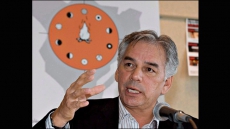OTTAWA - The number of Canadian firms applying for lucrative medical marijuana licences has topped 1,000, as a so-called "greenrush" continues to overwhelm Health Canada.
So far, only two new licences have been approved this summer even as the department tightens the application rules — and as nervous investors await decisions on their multimillion-dollar bids.
Health Canada says that as of Aug. 25, it had received 1,009 formal licence applications to grow medical weed since a call for proposals was issued last year, with 462 returned as incomplete, 201 rejected and 32 withdrawn.
That still leaves almost 300 applications being assessed.
Some 13 licensed producers are actively providing medical marijuana to patients, while another nine Health Canada-approved producers are about to market their products.
Just two new licences were issued in the last three months, raising questions among applicants about why the department's approval process is so slow.
In July, Health Canada tightened the rules for prospective producers, increasing some security requirements to ensure inventories of medical marijuana were stored in secure facilities.
A spokesman for the department says the new restrictive rules have not affected the approval process.
"The increased security requirements have not had an impact on the processing of active applications," said Gary Scott Holub in an email.
Even so, some applicants say the move appears to be aimed at smaller players, to discourage them from applying. And some still-unapproved firms are under pressure from their impatient investors, who have leased buildings, hired staff and paid legal fees with no returns in sight.
"Everybody is just living in fear" of having their applications rejected, said one insider. "It's a pressure-cooker ready to blow."
Health Canada radically changed the rules for medical marijuana on April 1, to end home-grown weed production in favour of commercial products under a new licensing system.
The department expects the new regime will create a private industry eventually worth some $1.3 billion in sales annually with perhaps half a million customers. Some applicants want to position themselves in the medical-marijuana market for the day when recreational cannabis may become legal.
As of August, some 9,448 clients had registered under the new system to order medical marijuana from the newly licensed commercial producers.
The issue of marijuana has become a hot potato politically, as Liberal Leader Justin Trudeau calls for legalization of recreational marijuana, and the Conservatives oppose the move, saying it would only increase use, especially among youth.
At the same time, Justice Minister Peter MacKay has said the government is examining whether police should issue tickets for possession of marijuana rather than clogging the courts with criminal cases.
Health Canada has imposed no limits on the number of licensed producers.
An estimated 500,000 Canadians use marijuana for medical purposes, though most do not obtain it through Health Canada-approved suppliers.





